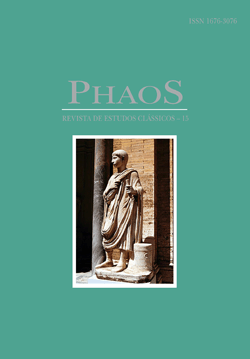Ovidius declamans: The influence of declamation in Ovid's heroides IV
Keywords:
Rhetoric. Declamation. Ovid. Heroides IV.Abstract
Declamation, the exercise on a fictive forensic or deliberative situation practised in the schools of rhetoric, became popular in the Augustan Era. Its influence on literature can be noticed: Ovid, above all, is not free from its style and language. Seneca, the Elder (Contr. 2.2.8-12), for example, gives a testimonial of Ovid's activities as a declamator. Therefore this paper discusses the Heroides IV, an epistle that belongs to one of Ovid´s most rhetorical works, in the light of the declamatory genre, focusing on style, like the use of sententiae, and other thematic and structural similarities.References
AUHAGEN, Ulrike. Rhetoric and Ovid. In DOMINIK, William. and HALL, Jon (Org.). A Companion to Roman Rhetoric. New York: Wiley- Blackwell, 2007. p. 413- 442.
BARCHIESI, Alessandro. Speaking Volumes: Narrative and Intertext in Ovid and Other Latin Poets, London: Duckworth, 2001
BERTI, Emmanuele. Seneca il Vecchio e la cultura retorica e letteraria della prima età imperial. Pisa: Giardini, 2007.
BLOOMER, Martin. 2007. Roman Declamation: The Elder Seneca and Quintilian. In DOMINIK, William and HALL, Jon (Org.). A Companion to Roman Rhetoric. New York: Wiley- Blackwell, 2007. p. 297-306.
BONNER, S. F. Roman Declamation in the Late Republic and Early Empire. Liverpool: Liverpool University press, 1949.
CASALI, Sergio. Strategies of Tension (Ovid, Heroides 4). PCPS, vol. 41, 1995. p. 1–15.
CUNNINGHAM, Maurice. The novelty of Ovid´s Heroides. CPh, vol. 44, 1949. p. 100-106.
CUNNINGHAM, Maurice. Ovid's Poetics. The Classical Journal, vol. 53, n. 6, March, 1958. p. 253-259.
CURLEY, Dan. Tragedy in Ovid, Cambridge: Cambridge University Press, 2013.
FAIRWEATHER, J. Seneca the Elder. Cambridge: Cambridge University press, 1981.
FANTHAM, Elaine. Rhetoric and Ovid's Poetry. In KNOX, P. (ed.) A Companion to Ovid. New York: Wiley- Blackwell, 2009. p. 26-44.
FOX, Matthew. Rhetoric and Literature at Rome. In DOMINIK, William. and HALL, Jon (org.). A Companion to Roman Rhetoric. New York: Wiley- Blackwell, 2007, pp. 369-381.
FULKERSON, Laurel. The Heroides: Female Elegy?. In KNOX, Peter. (ed.) A Companion to Ovid. New York: Wiley- Blackwell, 2009, pp. 78-89.
GIOMINI, Remo. Ancora sulla struttura retorica nelle Heroides ovidiane: l´epistola di Fedra a Ippolito. In: AMATA, Biagio (Org.) Cultura e Lingue classiche 3. Roma: L´Erma, 1993.
GROSS, Nicholas. P. Rhetorical wit and amatory persuasion in Ovid. The Classical Journal. vol. 74. n. 4, May 1979. pp. 305-3018.
KENNEDY, George. Classical Rhetoric and its Christian and Secular Tradition from Ancient to Modern Times. Chapel Hill: University of North Carolina, 1980.
KENNEDY, Duncan. Epistolarity: the Heroides. In HARDIE, Phillip. (ed.) The Cambridge Companion to Ovid. Cambridge: Cambridge University Press, 2002, pp. 217-232.
KENNEY, J. F. Ovid's language and style. In BOYD, Barbara W. (Org.) Brill's Companion to Ovid, Leiden, Boston: Brill, 2002, pp. 27-90.
KNOX, Peter. The Heroides: elegiac voices. In BOYD, Barbara W. (Org.) Brill's Companion to Ovid Leiden, Boston: Brill, 2002, pp. 117- 140.
KROLL, Wilhelm. Studien zum Verständnis der Römischen Literatur. Darmstadt: Wissenschaftliche Buchgesellschaft1924.
JACOBSON, Howard. Ovid's Heroides. Princeton: Princeton University Press, 1974.
OPPEL, Eberhard. Ovids Heroides. Studien zur inneren Form und zur Motivation. Erlangen – Nürnberg, 1968.
POEL, Marc van der. The Use of exempla in Roman Declamation. Rhetorica vol. 27, 2009. p. 332–353
RUSSELL, D. A. Greek Declamation. Cambridge: Cambridge University Press, 1983.
SPOTH, Friedrich. Ovids Heroides als Elegien. München: C. H. Beck, 1992.
SHOWERMAN, Grant. Ovid. Heroides. Amores. Cambridge: Cambridge University Press, 1977.
TARRANT, R.J. Ovid. Metamorphoses. Cambridge: Cambridge University Press, 2004.
Downloads
Published
Issue
Section
License
When submitting papers to PhaoS, authors should be aware that PhaoS shall hold all relevant copyrights over such papers if they are accepted for publication. Manuscripts will not be returned.

